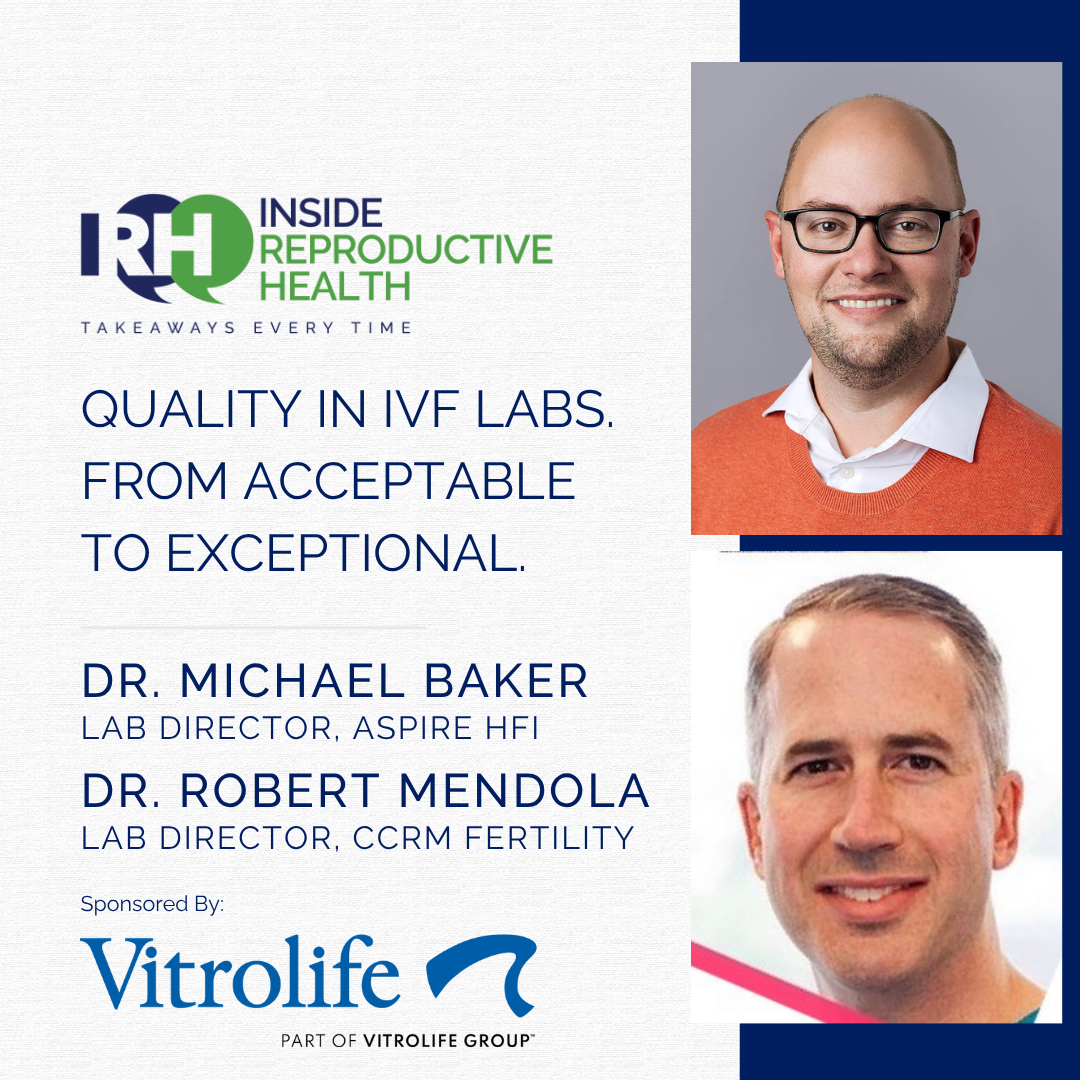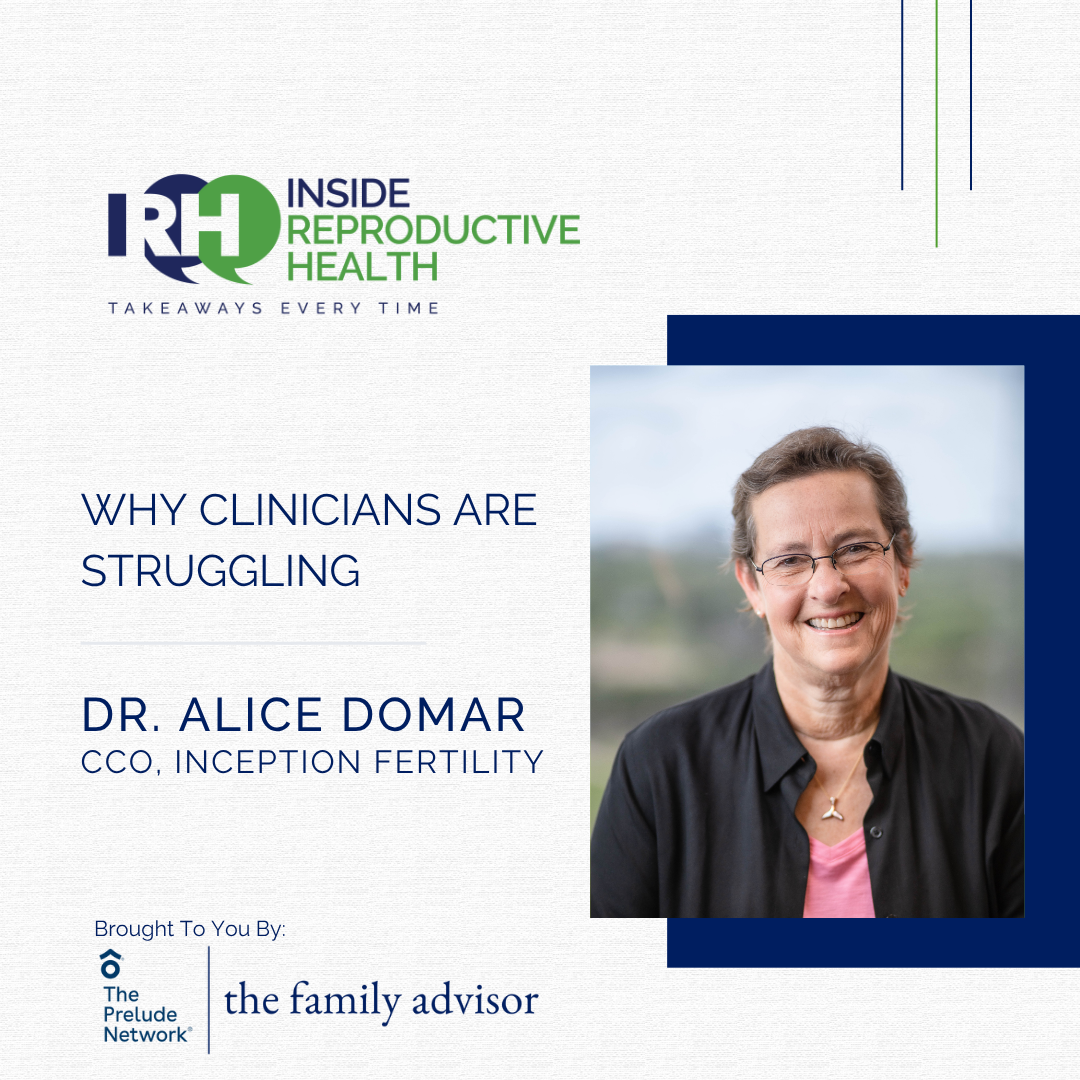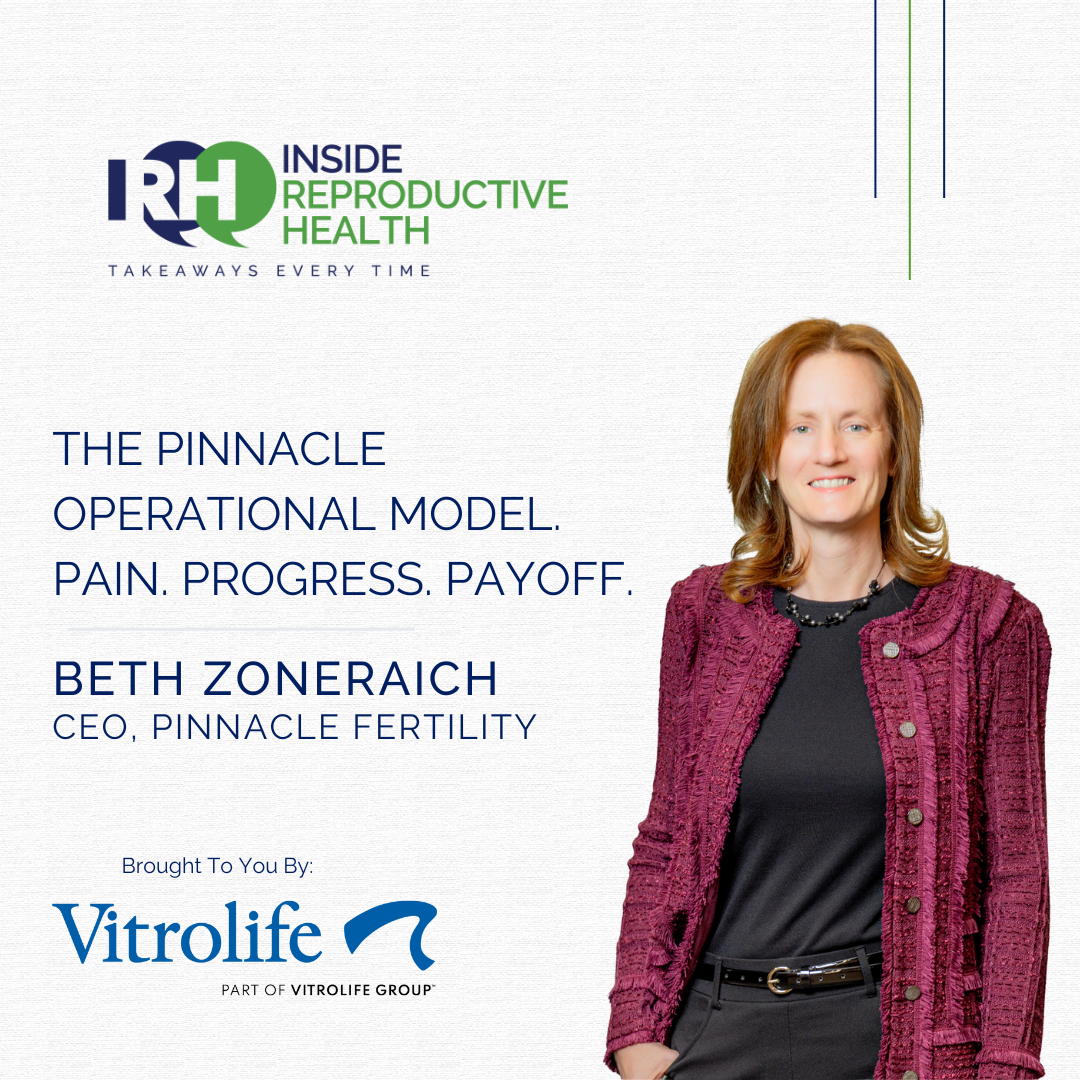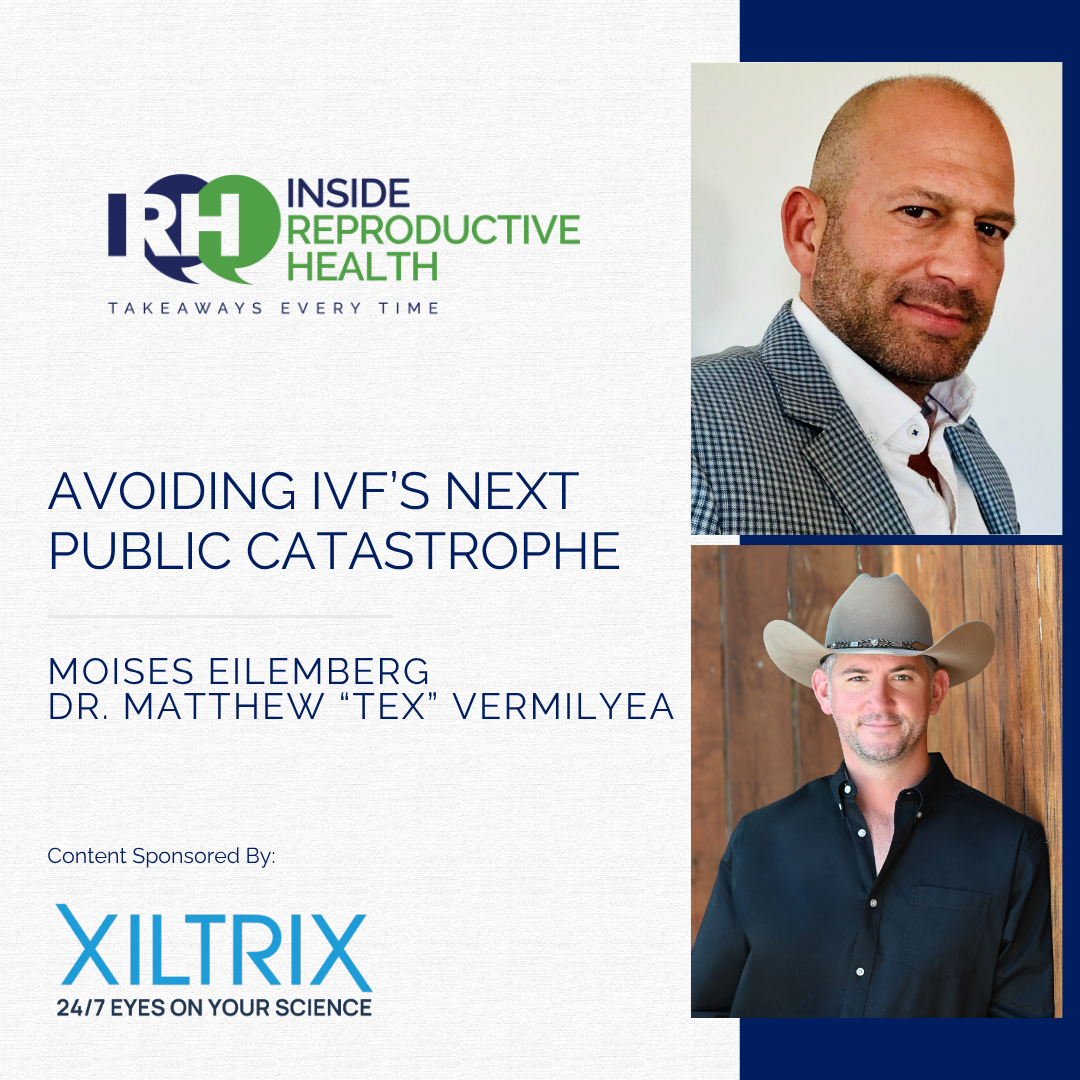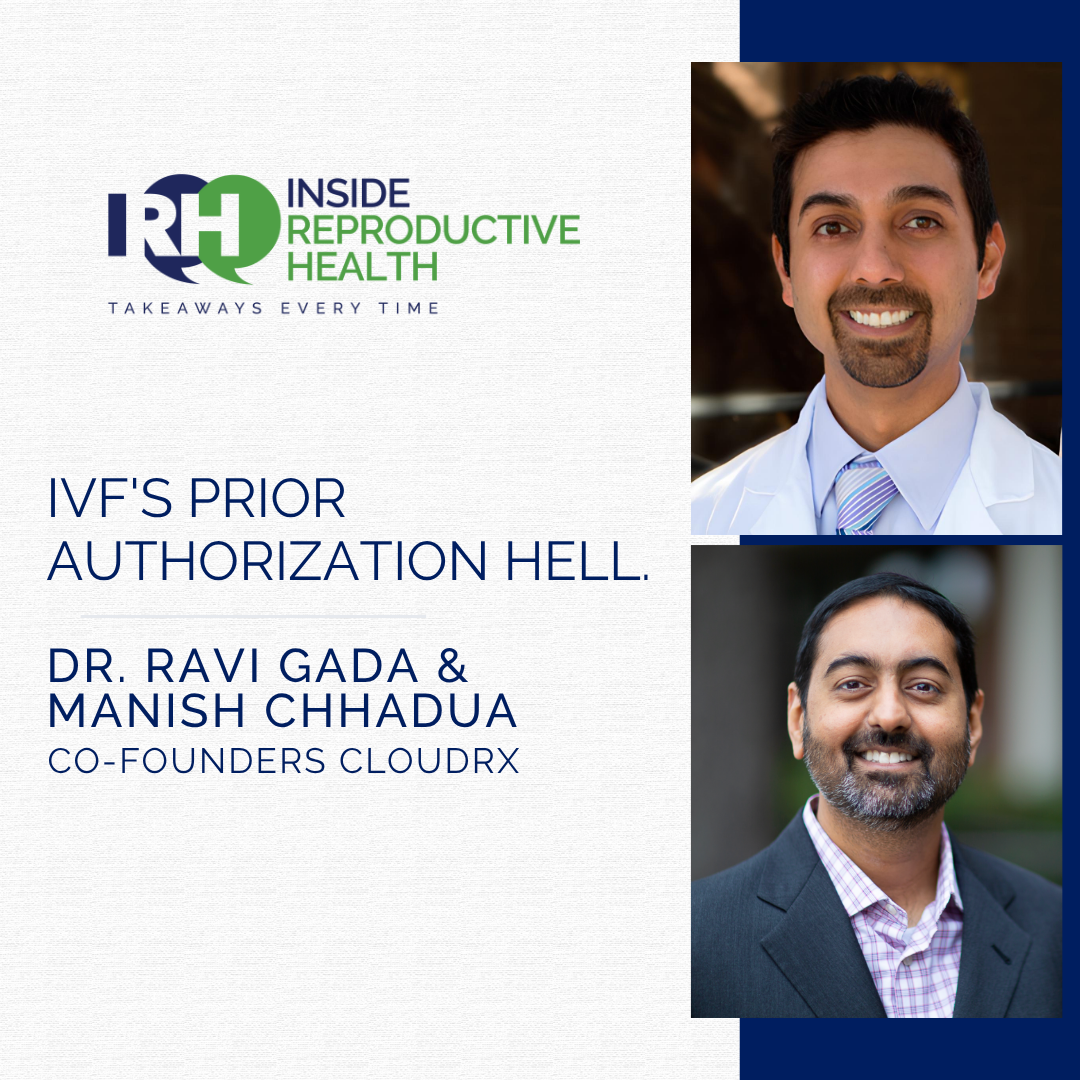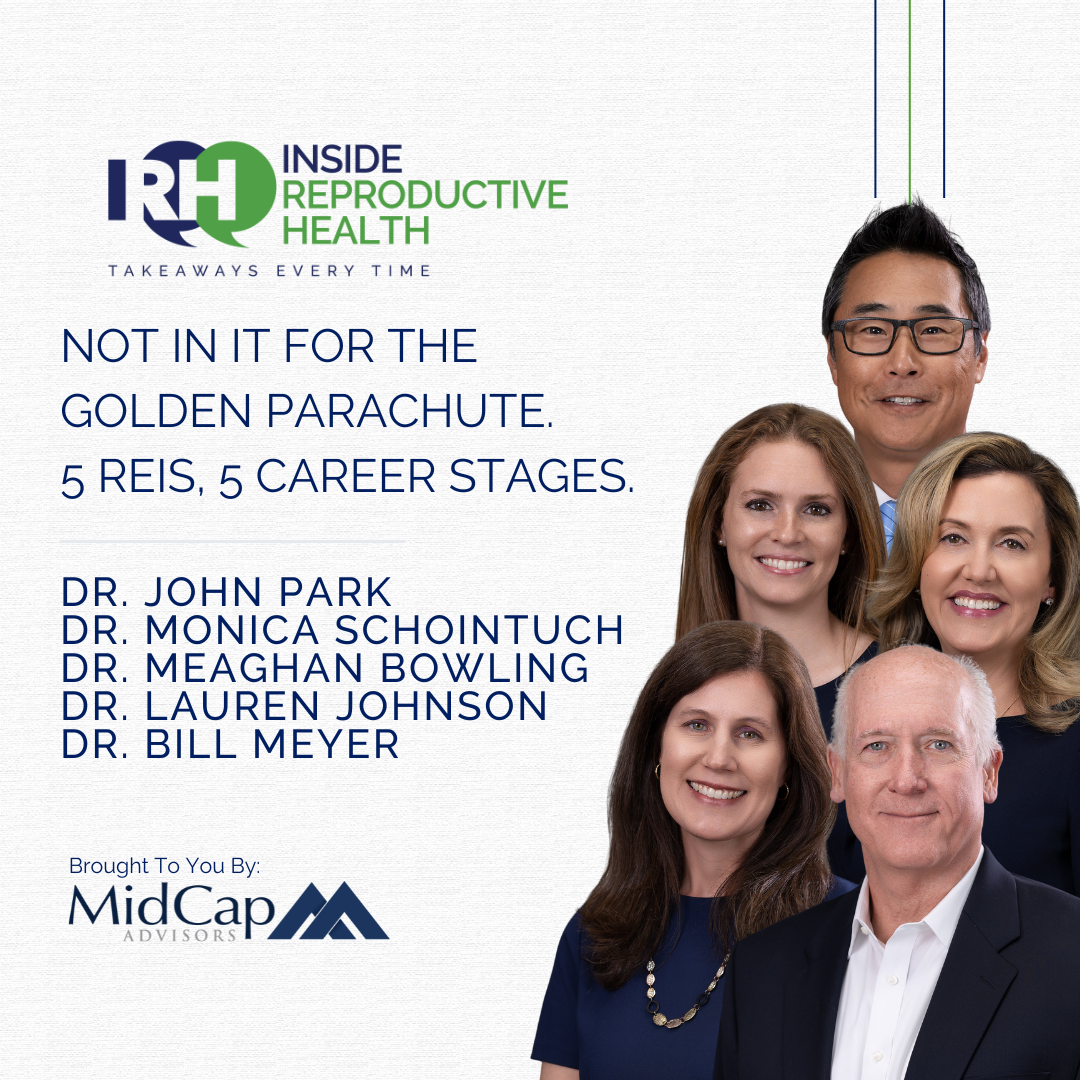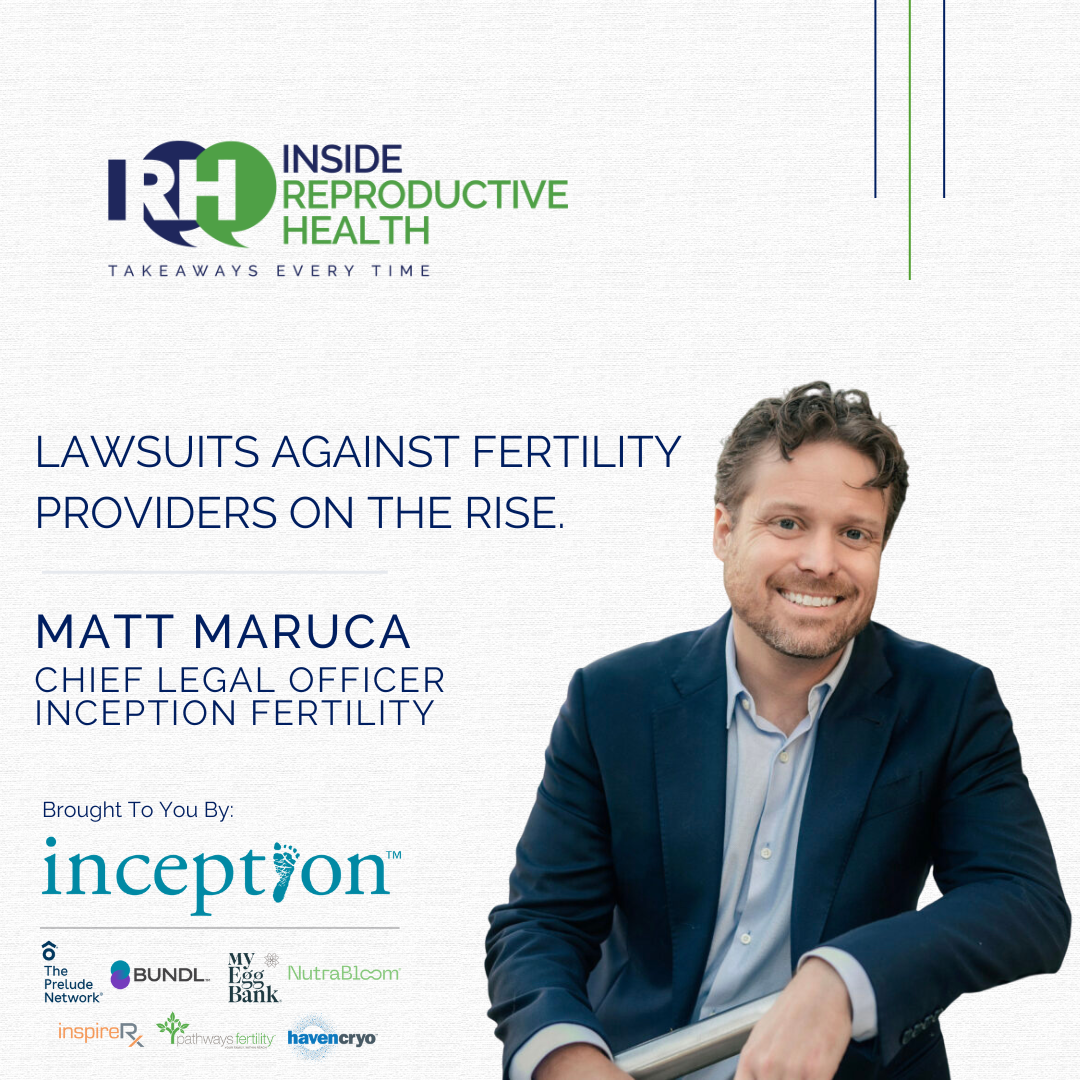Today’s Advertiser helped make the production and delivery of this episode possible. But the themes expressed by the guests do not necessarily reflect the views of Inside Reproductive Health, nor of the Advertiser. The Advertiser does not have editorial control over the content of this episode, nor does the Advertiser's sponsorship constitute an endorsement of the guest or their organization. The guest's appearance is not an endorsement of the Advertiser.
How much does an IVF cycle cost?
Seems like a simple question. But as this week’s guests explain—it’s not.
The way most of us account for “an IVF cycle” hides how many individual work orders and variables are actually involved. That lack of clarity can distort cost, efficiency, and strategy.
This week on Inside Reproductive Health, Griffin talks with Steve Rooks, co-author of a groundbreaking paper in JARG on activity-based costing in IVF, and Dr. Jason Barritt, Chief Scientific Officer at Kindbody, to unpack what’s really behind those numbers.
Together, they discuss:
– Why “an IVF cycle” isn’t a single service but a set of unique work orders
– How retrieval volume, ICSI, and PGT each reshape the cost per cycle
– The dramatic efficiency differences between labs performing 200 vs. 4,000 cycles per year
– The growing impact of managed care on margins
– How scalable systems like AURA from Conceivable Life Sciences could expand IVF access
Are Your IVF Lab Costs Hiding in Plain Sight?
Finally — a Promising Framework to Expose the True Economics of IVF Operations
For years, the real costs of IVF have been obscured by outdated accounting methods that can’t capture the complexity of biological inputs, skilled labor, and capital utilization. The result? A distorted view of efficiency, scalability, and profitability.
In this groundbreaking white paper, Dr. Alejandro Chavez-Badiola, Steve Rooks, Giuseppe Silvestri, and Alan Murray introduce Activity-Based Costing (ABC) — a transparent, data-driven model revealing how leading fertility centers can:
Uncover hidden cost drivers across procedures
Scale operations while maintaining quality of care
Project true per-cycle costs with evidence-based precision
Optimize resource allocation for sustainable growth
Provided by Conceivable Life Sciences, this paper is a must-read for IVF executives, lab directors, and investors seeking clarity in a rapidly consolidating field.
Discover how ABC can transform your understanding of IVF economics — and your bottom line.
Download the White Paper Now to see how leading clinics are redefining efficiency and transparency.
-
Steve Rooks (00:00)
There are a lot of factors that goes into the cost of an IVF cycle, starting with what type of cycle it is through labor rates, through utilization, through the actual supplies used, can vary by clinic. something that's not considered too often is the actual egg and embryo count ⁓ per procedure. So there's quite a few factors that could drive that cost of a cycle quite dramatically.
Griffin Jones (00:31)
How much does an IVF cycle cost? No, what is an IVF cycle? Those are basic questions, right? Not so sure based on the type of accounting that we've been doing to account for what an IVF cycle is, is an umbrella term versus the activity based costing that reveals how many work orders actually go into an IVF cycle or could go into an IVF cycle. So I bring on two experts. One is Steve Rooks, the other is Dr. Jason Barritt. Steve was the co-author of a paper in Jarg.
that talked about activity-based costing in IVF. And if you haven't read that paper, you've got to. We're gonna link to it in this episode, or Conceivable Life Sciences will have it on their website, but find that link, download that paper, read that paper. He did it with his co-authors, including but not limited to Dr. Alejandro Chavez-Badiola and Alan Murray of Conceivable Life Sciences, because what they found is that what we call an IVF cycle,
is actually several different work orders that really dramatically vary what the cost of executing that service might be. So I bring on Dr. Jason Barritt, who you know is the Chief Scientific Officer of KindBody, who has run labs for a long time and runs several labs now to get a better idea of what's going on. What you're seeing is egg freezing costs tripling.
at times when you are increasing the number of eggs that are retrieved. You have a much different cost than if you're retrieving 10 eggs than if you're retrieving 30, 40, or Steve's been in the retrieval room where 50 eggs have been
If you're biopsying the embryo for PGT, you have a much different cost than if you're not. If you're doing ICSI, you have a much different cost than if you're not.
Lab efficiency improves 30 % or greater between labs doing 500 cycles or 200 cycles a year.
and those 2000 cycle plus labs.
have even higher marginal cost than those doing 4,000 cycles plus.
in the future.
They've given me a to cover on its own as IVF labs, as reference labs that REIs use.
They each talk about what they would do if they were young independent practice owners starting from scratch right now.
They each prepare me to have this conversation again with a panel of Fertility Network CFOs.
And Dr. Barritt has me on the lookout.
for those dealing with the insurance companies directly.
because managed care demands efficiency. the cost averaging has existed in the fertility space for some time.
is now much different.
when you have those managed care payers.
that will devour your margins.
if you're not accounting for the costs properly.
Dr. Barritt talks about what impressed him about Conceivable Life Sciences system AURA
and how that scale is going to be necessary to bring IVF care to millions more than we're currently Enjoy.
Steve Rooks (04:19)
There are a lot of factors that goes into the cost of an IVF cycle, starting with what type of cycle it is through labor rates, through utilization, through the actual supplies used, can vary by clinic. And actually, something that's not considered too often is the actual egg and embryo count ⁓ per procedure. So there's quite a few factors that could drive that cost of a cycle quite dramatically.
Griffin Jones (04:46)
Tell me about where this is coming from. You worked on a paper. It's about activity-based costing in the IVF lab.
Steve Rooks (04:50)
Yes. Well, the funny thing is the genesis
of this really came from when I was the chief operating officer of the fertility partners. And there were three particular situations where I was screaming for something like this, because coming from a private equity background, a consulting background and engineering background, I had long been used to having this kind of tool to properly assess the economics of anything I was looking at.
So one great example, and Dr. Berrick has probably experienced this, we had two sister clinics fairly close to each other. One had been shut down for renovation. So the lab was shut for a good two or three months. And the arguments about what the transfer cost was going to be, what the one clinic with an existing lab was going to charge the other clinic to do lab services, was unbelievable. So I had to step in.
and do this kind of modeling to say, here's the real cost of that lab service. And you should be getting X amount of gross margin on that. So here's a fair rate. And it was less than what the clinic providing the service was expecting. So that was one example. Another great example is, and again, Dr. Barritt has gone through this before, I was frustrated with the lack of OEM of the equipment vendors.
not providing me with the kind of economic justification to say, hey, why do I want to spend $100,000 on a time-lapse incubator versus a regular bench top for $36,000, $37,000? Please help me justify that because I've got a CFO in the back here who's not going to be too happy unless I can justify it. So again, being able to bring the economics of the value of a time-lapse incubator from a time standpoint, an outcome standpoint, et cetera, I didn't have those.
It all starts with ⁓ a good understanding of the baseline economics for your particular clinic when you're looking at making improvements or changes or trying to come up with pricing strategies, et cetera.
Griffin Jones (06:48)
So you're referring to this model and you said you wish we had this kind of tool, but people don't know what this is. So you're talking about activity-based costing. Tell us what activity-based costing is.
Steve Rooks (06:53)
Yes. So yeah. so then this,
yeah. So in this case then, down there, basically the conceivable team came to me and said, Steve, we suspect you probably have a good handle on the economics of clinic and lab operations. Could you help us come up with an activity based costing model? Which I said, yeah, I pretty much have the elements of it, but let's go into a little more detail. So that was the basis for the jarg paper.
that I'm sure you'll list in the credits for the podcast. But that jarg paper was meant to look at a fuller range of economics that I hadn't done before. So basically, this approach starts with understanding the fixed time, the variable time on average or on a conservative estimate for each step in the process from sperm prep and egg processing through to vitrification.
you measure the fixed time on average for your clinic and the variable time for egg for embryo so that you can come up with the time consumed properly for each full procedure from start to finish. Then you would work out what is the true labor burden rate. And all too often, what standard accounting might do, might say, OK, we're paying them whatever, $60 an hour. So that's the number we'll use.
But the reality is it doesn't consider all the burden cost of an, of a, particularly a senior embryologist in terms of going to conferences or time off or, you know, vacation, et cetera. So when you pull all that burden together, along with the fact that they're not being utilized a hundred percent, no embryologist is being utilized a hundred percent, even though on those crazy days midweek where they feel like they're being utilized 125%, the reality is they're, they're typically being utilized between
70 to 85 % or so depending on the fluctuation in the workload. So you've got to count for that. So the actual cost per hour is not going to be 60, 70 bucks. It's going to be more like a hundred bucks. So you layer that on. Then you lay out a full bill of materials and many clinics do this, a full bill of materials for each procedure. You know, what are all the elements that you're using in that step for a given procedure? What's their unit cost, et cetera. And that's going to vary by clinic as well too, but you layer that on.
And then the final step, often is never done, is to consider the equipment being used for a given procedure. So, you know, egg freezing versus Ixian biopsy is very different. And there's a capital charge with the equipment that's being used that should be considered if you are thinking about anything that drives changes in investment, et cetera. And so what I literally did is for each one of these procedure steps, I said, here are all the equipment that's being used. Here's how much time is being used.
Here is the capital charge for that equipment in terms of we spent X amount to buy it. The effective cost of that from a cost of capital is whatever, seven, 8 % effective interest. So you can create a capital charge for the equipment you're using. And then that, of course, goes into play when you're thinking about changing equipment, et cetera. So all that comes in to say that what you get then is an average cost per procedure.
that also varies by the number of eggs or embryos. And that has a big part to play depending on that variable component. And by the way, this may sound like a lot of work, but the reality is anybody with a good electronic witnessing system should be able to capture this very, very easily in terms of capturing the start and stop time for each element of the procedure. Those without electronic witnessing can certainly do time studies. And that's what we did by and large for this effort is to get the time studies.
But by doing this analysis, what we can see is how does that cost vary by the type of procedure? So comparing say egg freezing to an IVF cycle with with ICSI and biopsy to also looking at the variation around the number of eggs or embryos processed for each one of those and how that varies around the average. And then finally looking at the impact of scale. So what is what is 4000 cycles cost per cycle?
in a 4,000 unit operation versus say eight 500 unit operations. And the reality is the cost is going to be higher if you've got that distributed 500 unit versus the 4,000. There's something called pooling of resources that makes a larger operation much more efficient from a labor standpoint, which effectively increases the utilization rate. And therefore the burden rate comes down in that situation. Anyway, that is probably more than one.
Griffin Jones (11:32)
Let's try to dig in into
those today and Jason, I want to come to you for a second because you've run labs for a long time.
So intuitively, as an operator, you've probably seen this principle for a long time. What did the paper show you and how did it relate to your experience?
Jason (11:54)
I will say thanks for opening this discussion up because the truth is we are trying to reduce the costs so we can have more access to care. It's one of the things as the kind body chief scientific officer I am burdened with is trying to find the most efficient way of doing it so we can serve even more. We've expanded and grown quite a lot with the 24 laboratories across the United States of varying sizes as has
Some of them were really only running two, 300 cycles a year and some were running 3,000, 4,000 cycles in. And so I have all the different parts of what was in this paper. And we're a bunch insurance and then some cash pay. And then it happens to be that KindBuddy is also an enterprise client.
⁓ We go direct to employers and so we have a direct feed of patients there who we have to see as we're the only provider for it. So we have to have scale and resources available for those. It happens to be that we have a very, very, very large client in Walmart and that one happens to have employees across the entire country. We need to be efficient in being able to serve them and they can't all travel everywhere to one place in order to get that service. So we had to be spread out.
What the paper really showed me was, I'll call it the true number. I had this knowledge. sort of, every practice owner definitely has it. We see, my gosh, an embryologist costs X. A partially trained one costs X lower. And then finally, a trainee costs this. But my, I have to have a senior person with the trainee the entire time. So it's actually even more expensive to have different people at different levels. And then,
Hey, yeah, if I do one case on a day versus I do 10 cases on a day, if I still have to have four people at work, I'm really inefficient with my person usage time. And then there's also, hey, it's a 10 case day. And we ended up with four cases that had 30, 40 eggs each and then 10 cases that had 10 or less or all the other cases that had 10 or less. Well,
That is very inefficient in what it's occurring also. And you have to prioritize the use and time and equipment. So I have this knowledge, this understanding when operating these that we have to always be ready to handle whatever comes in the door. That's great. That's exactly what we're supposed to be prepared for. Unfortunately, that leads to massive inefficiencies in you're not always going to get everything in the door every time, but you got to have everybody ready there and you got to have all the equipment there.
And the truth is, having two micromanipulation setups with laser systems, two hoods or more with all the microscopes that go in those things, with two to maybe even three times the amount of incubators you would actually be using at any one moment efficiently, your cost is massively high in order to be prepared to handle whatever comes in. And the embryologists don't actually control how many come in the door.
That's actually an efficiency that occurs way before the lab, way before the OR. And we have to pay attention to that because I can't overstaff, but I sure can't understaff. Understaffing is risk and other types of inefficiencies that come with it. That is not what we're in the business of. Let's reduce that, make it efficient, make it safe. So we have to have the people here to handle whatever comes in. So what the paper truly did is put numbers to it. So
Instead of me as a chief scientific officer, I can discuss with the CFO, I can discuss with the chief operating officer and technically even the CEO where our efficiencies are and where our burdens are and dealing with those in different ways. More equipment, more people or batching in some clinics, to be honest. All of these have downstream effects, positive effects when analyzed. This put numbers to them.
And that allowed us to have a better discussion about the efficiency of use of everything in lab. Now, you called it ABC for the cost and determining the cost. Two of the biggest factors you brought up, we all knew it, is the number of cases that land on a day and the efficiency of that, and then how many eggs and or embryos you're handling. These have huge effects. think...
Steve Rooks (16:08)
Yes.
Jason (16:19)
I think in one case, you specifically described a 300 % increase in the number of eggs for egg freezing, costing 165 % more of your resources in the lab. Congratulations, you got more eggs. And the same price was paid by you as the same price was paid by somebody else. Because of that, because of the way that pricing model exists even today, we have to charge a higher amount
Steve Rooks (16:34)
Yes.
Actually,
Jason (16:46)
for those who get less eggs, because we're charging a lower amount for those who have more eggs, because I have to staff it. I have to have the equipment there to handle when I get given 30 eggs to freeze versus when I get given 10 eggs to freeze. So it's a model that allows me to see numbers and have a rational discussion about it. Now don't get me wrong. These are people at equipment handling things for patients.
Steve Rooks (16:50)
Yes.
Jason (17:12)
And they're going to have some elasticity. That's the other main thing that you put into the paper. There is some elasticity in the system, but it's not forever. You will break that rubber band at some point and not be efficient or safe any longer. And so you have to really think ahead on these ones. And as was also described in equipment purchase, I'm going to use your example again of a time-lapse incubator, unbelievably wonderful incubators. And then they come with a whole lot more data to go with it.
Steve Rooks (17:37)
Yes.
Jason (17:41)
But if you can't use that data efficiently and or you can't appropriately charge for that, both in time and in equipment expense, you will not be able to get any return on that investment. And that is a big deal. If we're actually trying to increase care and increase success, we need to really know what those are. And that's what the paper really helped us look at.
Griffin Jones (18:06)
Let's talk about that example that Dr. Barritt brought up of the number of eggs that are retrieved and how that can cause a lot of variance. Am I understanding correctly, Steve, that when I read the paper, seemed like egg freezing costs increase 55 % if you're tripling your egg count. if you're retrieving 30 eggs or 40 eggs versus 10, talk to us about what's going on.
Steve Rooks (18:34)
Yeah, actually Dr. Barritt is
right. It's almost a tripling of the cost. And the perverse thing there, especially if you look at it from an IVF cycle standpoint, less the egg freezing.
Griffin Jones (18:43)
Sorry,
of what costs specifically? Of just embryologist time?
Steve Rooks (18:46)
The total cost.
yeah, everything because of the multiplier effect of the number of things. mean, using our conservative framework, because we wanted this not to be a benchmark exercise. We wanted this to be a framework illustration because again, every clinic is going to have different inputs to this model. And I do have it in Excel that allows you to do your own thing, but using that conservative thing as a, just as a baseline.
10 eggs, you're looking at a total cost of roughly $1,000 per cycle. 40 eggs, and this is in a 500 cycle lab, by the way, 40 eggs would be almost $3,000, $2,800. And that includes the capital charge. It includes the time and the supplies, et cetera. So that's a significant delta. And when you consider that,
Delta on the IVF side, you know, we were all focused on doing what Dr. Sable likes to say about reducing cost of baby. And the perverse thing about charging a fixed fee, even though that seems, you know, common sense, charging a fixed fee for say an IVF XC with biopsy is that the poorer responders are effectively paying more per blast, far more per blast than the
good responders who are much more likely to have a baby sooner. So you're exacerbating the cost to baby for the poor responders if you're charging a fixed rate versus some kind of variable rate that accounts for the fact that they're costing you less to process. So that's something that I don't think the industry is about to jump on board and say, okay, we've got a variable pricing structure for IVF-IXI to make it fairer to the poor responders.
But that's a perverse result of this analysis that points to that fact that the poor guys are subsidizing the good responders who don't need subsidizing at all. But anyway, that's a good example of what came out of the analysis.
Griffin Jones (20:44)
And I should keep reminding people throughout the course of this conversation, we're going to link to the paper, we're going to link to it maybe either directly or we'll link to Conceivable Life Sciences page where it lives. But it'll be on the pages where we distribute this podcast episode, we'll put it in the show notes if you're listening. If you just came through like Apple Podcasts or Spotify, find it through Conceivable Life Sciences or through Inside Reproductive Health.
podcast page. If you got it via email, we're going to link to it there. And I'll give a little bit more of a background on the paper since this is you're one of the co-authors, Steve, and this was in JARG, which is the Journal of Assisted Reproduction and Genetics. are a co-author. Giuseppe Silvestri is a co-author. Alan Murray,
and Dr. Alejandro Chavez Barriola, are both co-founders of Conceivable Life Sciences, are co-authors. So you talked about the variables at play. Jason, did you ever make it down to conceivable in Mexico City? And where might robotics in the future play into all this?
Steve Rooks (21:38)
Yes.
Jason (21:56)
Hmm.
Well, thank you for bringing that up. I actually didn't have to go down to Mexico City. I got to see all the equipment operating live as they can stream it all now. And I actually got to very luckily in San Antonio for this year's American Society of Reproductive Medicine. I actually got to go see a setup for the first time, think probably ever a robotic system, fully AI automated without human interaction.
pick up two embryos in two different drops and move them to another dish in two different drops all by itself with no human interaction whatsoever. And you don't think that is a big deal at first because every single embryologist moves hundreds of things every day. But the truth is to get a machine to do very accurate isolation movement in multiple dimensions, because remember it's looking at something and then moving fluid and tissues.
safely and securely and will stop if something doesn't go right. That is a giant complicated step. We think it's simple and easy. We'll pull out what we call a stripper tip, our hang on, and just go like that and we can move them up and down. But to realize how much that takes of our senses to be able to do is remarkable. And we're actually having to teach the computers how to do it. It's learning now itself and figuring it out. And it can be more accurate now. can.
do that work. So I was very lucky to see it live. As I said, probably the very first time in a hotel room in San Antonio, Texas, a computerized system moved embryos around. It was quite interesting. But yeah, I've seen the Conceivable Life Sciences ⁓ or the pieces of the AURA system or AURA system working now. That automation is technically the automation of what an embryologist does. This isn't
redoing embryology. This is using technology and advancing in it in order to replicate essentially what an embryologist is doing. Now, it has massive efficiencies once it gets going because the embryologist is the inefficient part of it. A robot technically doesn't sleep, doesn't need to go to the bathroom, probably doesn't have a bad day.
It's amazing what a robot can be efficiently versus a human. We are very efficient with what we do, but we're down other times and in other ways. So it's really an interesting thing. So what they did is show that automation will be able to make efficiency levels in this that are beyond anything, even in this paper, that exist. Additionally, as I sort of mentioned, the AI portion of this.
Although, yes, we need to think and we need to think about what we're doing, why we're doing it, how we're going to do it. The truth is the vast majority of an embryologist's day is repeatedly doing very similar things for the next patient and then the next egg and the next egg and then the next patient and the next embryo, the next embryo, and then the next. It is much easier to let AI learn what to do in each one of those situations and
actually, and I know this sounds really bad for my career, but the truth is the AI systems can already look at a couple million eggs, a couple million embryos, know them, learn about them, grade them, move them, score them and rank them. And although I can see that many in my lifetime, it can learn that in a day or a week, maybe.
It would take that long and it can be as accurate as I am and more consistent in all likelihood. Therefore it's how I'm going to use that AI system to be efficient with me as an embryologist. If you let the machines help you do the inefficient things or the things that need to be more accurate and repeatable, you become the much more efficient item in this. So you have the machines doing the repeated work.
the pipetting, the movement, and then you have them helping with the grading, you can make this two other levels of efficiency, which would then massively increase the access to care and massively decrease once we can get there, the cost of doing this. The truth is an Aura system is going to be a lot of money at this point because it's such new technology to automate an embryologist and all the steps that we do on a daily basis. However, once that
can be done and the efficiency of how many things can be done in a eight hour day or even more, we are going to reach unbelievable levels of efficiency that have never been seen in this field. And we'll be able to do it reliably, repeatedly, and very, very safely, which is the key to actually us being able to go forward.
Griffin Jones (26:49)
That brings us back to your earlier point, Steve, about economic justification. How will robotics have an advantage in activity based costing or won't it? it is will it will it have some kind of disadvantage somehow?
Steve Rooks (27:02)
Well, basically it'll come down to one, it's much more consistent as Dr. Barritt said. I mean, there's variability across embryologists and part of the factor that drives inefficiencies in the lab is that variability across embryologists. So for a given task. So that variability would be reduced significantly.
And it's also, again, it operates much faster and without stress and without risk. And so it's gonna come down to the pricing that they have. And to some degree, this model helps a clinic consider, okay, I'm gonna build a new lab. How does my expected cost in that new lab compare to what Conceivable is offering? And that's a very telling, when you...
add in especially the capital costs, et cetera, that allows, especially for new labs, that consideration, but also if you've got to rebuild or renovate one as well. So it's going to be driving down the labor component of it. You're still going to the same supplies. There'll be some slight modifications. And it's going to be also the capital costs that's effectively embedded. So it all comes down to how they're going to price, Conceible's going to price the system relative to
the effective status quo cost that you'll see in clinics.
Griffin Jones (28:23)
which we're figuring out in no small part thanks to this research that you're doing and the things that Dr. Barritt's pointing out. Did I glean correctly from the paper that labs that are doing, 500 retrievals a year, they've got 40 % higher margins than centers that are doing 2,000 cycles a year? Yes.
Steve Rooks (28:48)
I mean, higher costs.
Yes. Yes. ⁓ Yeah, the this comes into ⁓ something as a mechanical engineer. I, you know, had studied way back of understanding the power of what's called pooling resources. And the overarching analytic framework is something called queuing theory that goes all the way back to the original use was evaluating
Griffin Jones (28:50)
Yeah, excuse me, marginal cost. excuse me, cost of a good tool.
Steve Rooks (29:13)
the pooling of resources on a manufacturing line, and then very quickly to the pooling of switches for telephone systems, et cetera. And what it does, it shows that if you're trying to process 4,000 cycles, if you were to do it with eight 500 lab setups versus one 4,000 lab setup, the 4,000 lab setup is so much more efficient. And the reason for that is driven by the stochastic nature
of the inputs that you're getting from the patients. And that goes back to what Dr. Barritt said, you could have one egg, zero eggs, 50 eggs. I've seen, I've been on site for a 50 egg retrieval and I felt pity for that REI doing that. But that variability combined with the variability and the different types of procedures going on. So you could have an egg freezer followed by an ICSI patient, know, both of them having 30 eggs, but having very different, ⁓
process times, et cetera. When you have that combination of variability in a workload, whether it's a telephone system, a manufacturing line, or an embryology lab, that creates waste when you're doing it, you're not pooling all the resources. So when you're separating those 4,000 cycles into eight separate 500 cycle units, you're going to have far more people
and it'll cost a lot more than if you could do it in one center that it can absorb that stochastic variability that you have inherently in the system. Does that make sense? I can show you a very detailed diagram of that, but I don't want to bore you with it.
Griffin Jones (30:43)
it
Well, I want to ask Jason how you would pool those resources together, like in the real world, like how you would actually make that happen. And I want to give Alan Murray, your co-author, some credit, Steve, because I never thought of an IVF cycle as a, as a, as a cohort of work orders prior to him making me think about that, that, that when we use the word IVF cycle, we are using a generic umbrella term to describe various
Steve Rooks (31:08)
Yes.
Griffin Jones (31:16)
work orders in various combinations. And you use the example, maybe you're doing XE, maybe you're doing PGT, maybe there's more eggs involved. And I completely understand your point that when you're switching from these different work orders so rapidly that you're gonna create an efficiency that it would be better to do multiple kinds of the same or similar work orders and then do multiple
kinds of another work order. But Jason, how do you do that in real life?
Jason (31:46)
Well, let me step back one second and give the 4,000 cycle lab versus eight 500 cycle labs. Those eight labs are all going to need one hood and one micromanipulation setup and then multiple incubators. Well, that's eight initial hoods, we'll call it. That's not the only thing you'd have in those ones, but you have a hood, essentially with heated surfaces, microscopes in them and things like that.
You're somewhere between 80,000 and 140,000 per setup hood with all the different things, including witnesses, systems, and things like integrated into it. Well, in a 4,000 place, you probably only need two retrieval hoods because you'd run two operating rooms, probably back to back to back to back, be able to retrieve into the two different hoods. You'd be efficient. The other places you need eight hoods. That's four times more money upfront just for equipment. Now personnel. The truth is doing
Eight individual retrievals of one at eight places is one embryologist in the efficient use of their time. Eight retrievals in one day in a 4,000 case place. Not that this is probably best, but you can put out one embryologist in that seat, maybe two, and switch them out. You are much more efficient than having eight people. So that's how you have to think about it from the standpoint of why larger places, or what I'll call a reference lab.
will be the key to the efficiency and bringing the cost down.
I'll say this in the conceivable thing, which is why I totally understand why Alan and the conceivable team really wanted to have an understanding of this, because they're trying to model an embryologist, but also make it more cost effective to do it and scale it. And that's the other beast of this. The automated embryologist, Aura, can probably do the same procedure an embryologist would do, but
They don't need a huge amount of time in between each one and they don't need another one sitting there ready to sit in and go and do the next thing. And therefore it can be at least two times, if not eight times more efficient with just the same procedures. And therefore what you've done is you've scaled it in a way that truthfully, in order to mass serve all the people who need the care and it's millions of people who are not eligible in the United States, at least I have no idea what the number would be in Canada.
but millions of people that are not getting the care because of the cost to get in the door or not covered by insurance, or even when some is covered by insurance, it's still sometimes quite a few dollars after that. We have to probably go to Hub & Spoke, which was a discussion item, in the fact that we have a large reference laboratory surgical center.
that handles a large number of cases. And then we'll give you your example again, eight satellite clinics that are all feeding into one, because the key thing is that efficiency of use. The conceivable system would be able to handle all that without a problem and have minimal other staff around instead of eight sets of staff all going to work in individual places every day in order to serve it. It also means that you can get
and I know this sounds a little weird, but you can get a little farther away from your laboratory and serve even more patients. Because the truth is, a lot of labs are in, I'll call them big cities. Not everybody lives in the big city. Some people live a half hour out, some people live an hour out. In LA, some people live three hours out, which I don't understand that commute, but whatever. You would be able to even see more patients because you would see them
most of the time at their local satellite and only have to travel into the main center once for retrieval and once for transfer, possibly if we're 100 % successful. And therefore, you're even more efficient with your use, your time, your people, the commuting, and how many patients you can see. So.
Just making an automated embryologist isn't the real goal. Yes, it has to be done in order to get to the true goal. And we have to use AI to get better at it, then we can even be more efficient with it. But it's also the model of this efficiency of large numbers of cases in one very expensive location. So we can cost average this down. It's just not efficient to do eight individual satellite locations all with full build outs than one that eight feed into.
Griffin Jones (36:11)
This volume and scale, Steve, is this, we had an inflection point because of that, that account, excuse me, that activity-based costing is necessary. I think of another sector where activity-based costing is paramount and really commonplace, and that's professional services firms, your McKinsey's, your Bain's, your...
but also your group M's, your Saatchi and Saatchi's, any large professional services organization has these costs down at the activity based costing level. And I think of that same sector where they don't have it down and it's boutique niche firms. So I had a low seven figure boutique niche professional service firm. We didn't have this down. We charged a price premium.
And we could because we were doing strategy and we were deeply in a niche, but it was a niche boutique. was not scalable. In order to scale, you would have to have what Saatchi and Saatchi has in place. Are we at the point right now where we made it this far without knowing all of this variance in cost because we were a boutique field, but now this is the standard for how costs need to be calculated?
Steve Rooks (37:11)
Yes.
Yes. And I'll put my, my ex consultant hat on and say, you know, we're still in that the fertility vertical is still in that kind of premium service view and has not, and it's very reluctant to switch into whether it's the Tarjay or the Walmart of high volume, lower cost. And this is where you're starting to see it. Like, you know, guys like
Paco at positive and certainly Dr. Kiltz has been doing it forever at CNY. Cause the interesting thing is when you look at the actual numbers, you know, are the 400 art cycles at start reports, 200 are actually retrieval cycles, donor cycles, roughly. given 450 plus clinic labs in the U S that implies that the average clinic lab in the U S is doing less than 500 cycles. Now. Yeah. There's some big operations like say shady Grove.
And of course, Dr. Kilts in Syracuse and Dr. Barritt mentioned, probably one of the vile locations in Chicago, are at that scale and are taking advantage of it. if we truly want to significantly lower cost to baby, as some are trying to do, in order to expand access and affordability, we're going to have to start sharpening our pencils and driving the efficiencies
in new ways to get the, just recently did a recalculation of cost to baby using the latest and greatest numbers. On average right now, if you, you use the SART data from 2023, cost to baby, gross cost to baby, including all meds before coverage, before insurance, et cetera, is $85,000. And that's basically 2.8 cycles times roughly $30,000 with all in. So you $85,000.
for the average. And now we know, you know, going back to the poor responders versus the good responders, that you're going to have some patients that are going to try everything they can. They're going to spend 200,000 plus. And so in order to then enable all the middle class and more people to access this, we've got to get that cost down, cut it in half ideally, but at least a third. So this is where leveraging the consolidation, as Dr. Barrison said,
to get more 4,000 cycle operations is one path to cutting that cost by 30%. So yeah, I think we're at a point where it'll take a few key firms to really go after to say, you know what? I'm done with the premium model and I'm gonna focus on driving volume and still make good money.
but driving a more efficient operation and still providing high touch through technology, know, a better patient engagement apps, you know, things like cycle clarity using AI across the journey in order to still give patients at a lower cost an equivalent or better experience.
Griffin Jones (40:17)
Where do you think practices need to start? one and before I want to get each of your advice on how I have this conversation with CFOs because I'm going to I'm going to do I'm going to have like a panel of two, three, four CFOs read the paper and then I'm going to bring them on and I want you guys to coach me a little bit for when they try to give me the we already knew that answer. So but
Without even talking about those folks, let's talk about maybe the independent practice owner. I'm thinking of a lot of these young docs that have just started practices in the last year or two. That cycle is starting again, where younger docs who were associates at networks for two or three years, they've decided, okay, maybe I go the partnership track, or maybe I go do my own thing. For those that have gone and done their own thing, they're figuring all of this out for the very first time, and they have the opportunity to do it right from the beginning.
Steve Rooks (41:12)
Yes.
Griffin Jones (41:12)
What should they do?
Steve Rooks (41:14)
If I could start first and then Dr. Barritt can follow up on it. I would say it's going back to actually what Dr. Barritt said about the hub and spoke model to say, to go back to a different version of what Ovation and CCRM did by creating larger operational reference labs and having those new clinics with the very capable and eager, you know, younger REIs not having to worry about operating a lab, but just having the procedure room and the egg processing and the embryo thought capability.
and partnering. Now the key is conceivable with whomever has to set up these reference labs in the appropriate locations so that some of the smaller motivated, you know, mid-career REIs can say, you know what, I can go off and I don't have to worry about the lab because I'm going to get that service very efficiently, effectively at a lower cost through the conceivable partner reference lab. And I'm going to focus on the front end with the patient and the clinic, cetera. So that is my view of where
this could go with conceivable coming into play or scale coming into play. Let's call it that instead.
Griffin Jones (42:20)
Is that the way you do it, Jason, or do you do it a little differently?
Jason (42:22)
Hmm.
So I think we're going to go through another transition. And that's the transition of what I'll call managed care. In the United States, at least, it was a premium. It was not generally covered. It is getting covered now to certain level. That's actually going to drive our efficiency and our costs down. Because the truth is, insurance companies are supposed to make money. They are an in-between.
they're gonna take a piece of that pie. The only way to have that piece of pie is find that money somewhere else in the system. And if you also wanna reduce the cost, which they would really like to do, that means you have to be even more efficient at the clinic and or lab level. They're going to push for these things. They want to cost average down and so does the clinic in order to be able to serve that number of patients. Now, that means more work per se for the same amount of dollar.
However, they're going to drive that because that's the only way to get to the coverage levels that need to be there. I mean, who knows what the real number is, but one in six couples have difficulty. At least one in 10 need true intervention. We just don't have the scale to handle that at this point. And so even if your example, Griffin, the, I'll call it the near the beginning of their careers, REIs, politely,
They don't have one and a half to two and a half million dollars to just invest in building a laboratory, surgical center or procedural center, hooking to it and them being the only provider using it. And the return on that investment, unless you're going to have a big PE firm or somebody come by you, is not going to be good for quite some period of time. And most don't have the capital to be able to do it. So they're going to have to come together. The example is
as you said, is a reference laboratory. I was very lucky to run one for 10 years in Beverly Hills, California, where we had seven internal physicians, which based the majority of the cases, not too much more than the majority, but the majority of cases at that location. And then 19 other physicians in this beautiful Los Angeles area would all bring their patients to Beverly Hills for their laboratory care, surgical and laboratory care. This allowed that efficiency.
My team in the laboratory was able to staff at an appropriate level to handle whatever was coming in, handle big cases and small cases, and do it in an efficient way. And all those other physicians who were outside of it did not have to provide capital investment, which then lowered the cost that they were charging the patients, or they could take more insurance patients. That allowed the efficiency and more care to happen because we did that model. I believe...
that what's going to happen is insurance is going to drive down the cost because they're going to want to cover more people for the same dollar. And they're going to make some money because they don't really do anything unless they're making money. And that means it's going to come from somewhere. And where it's going to come from is the clinic and the lab. And therefore, we have to be more efficient in both of those. You mentioned cycle clarity, Steve. So the efficient use for ultrasound evaluation of the follicles as they're growing and developing is, you
very uncomfortable situation that you have to go in and get scanned and things like that. So they've reduced the time from many, many minutes of having to go through that procedure to one. That makes it so much better for the patient, so much more efficient for getting patients in and out. Also, you can literally see between four and five times the amount of patients that you were spending before. And the machine can do the measurements, accurately put them into the EMR and calculate everything for you. You don't have to have humans sitting there.
copying it onto a piece of paper or scanning it in and then scanning it into another system and then evaluating what this... All that efficiency occurs because the computer assists with it. And then additionally, it can assist the physicians in helping understand when in the cycle might be optimal based on the growth and development of those follicles to actually surge that patient. I'm not saying the computer will ever tell us exactly what to do. We do need to intervene. But it's pretty darn accurate for the estimation of what
should be done and then can estimate the number of eggs you'd expect, the number of mature eggs you'd expect, and you can start to model out the efficiency of a lab in how many cases they're going to have on Wednesday next week and how many cases and how many eggs they're expecting to be able to retrieve on that Wednesday. And therefore, they can staff appropriately or have equipment and services in place to handle that. That's what's really coming and changing.
is if we can use these things efficiently. Because like psychoclarity is a, I'll politely call it, it's a computer system that you access through your ultrasound machine and your EMR. The polite answer is eight different single physician practices all could put their data into one system. They can all get their individual patient data and have no problem with that. But the system could also connect all eight of those because they're all going to bring those eight cases to one reference laboratory.
Steve Rooks (47:18)
Exactly. Yes.
Jason (47:18)
for efficiency purposes, now they can plan. They can know
how many embryologists need to be there Wednesday next week.
Steve Rooks (47:23)
That's a very good point that that reference lab is going to need a coordination and true manufacturing planning system. I hate to call it that, but that's what it basically is. would, which very few clinics actually have. So Griffin, could add one thing actually to that is kind of thing. I've actually had an REI who's seen the paper reach out to me and say, I want you to do the front end of the clinic. Now I want you to do ABC from the time the patient calls in.
Jason (47:46)
You
Steve Rooks (47:50)
through the procedure to the lab. So I have end to end visibility on the true cost. So I could really start seeing where I'm costing myself and my patients extra because I'm inefficient and other ways to deal with that. So.
Griffin Jones (48:05)
Hopefully Beth and Nate are listening because they probably have good data for that that you could plug into. So Beth, then Nate Zunreich, if you're looking for a research partner, Steve Rooks just raised his hand. And I've also made a little note that Reference Lab has its own topic and mapping how Reference Lab would work is its own podcast episode. So we're going to do that one too, fellas. And so I've written that down.
Steve Rooks (48:23)
Yes.
Jason (48:28)
So can I say one other quick thing before you
leave it? I am not saying the individual doc, individual laboratory, I'll call it concierge level, hand holding, anything you need done, highest level, it's very inefficient, cost dollar-wise, but it will still exist. And it will exist because not everybody can be treated by, I'll call it the standard or the general care. There will be some who need beyond it.
Technically, there's also some who want the high touch. They want that, I am not a general patient. It's gonna exist. It's still going to be in place. Politely, let's just say you can go to an orthopedic surgeon and you can get a knee replacement done or a hip replacement done. But if you really want the A level, you really want that other one.
You might have to go out of network, out of pocket, out of everything, but you want to be able to pitch again for the Dodgers. You're going to pay for that concierge level. You're going to do that because there's a reason to. So it will still exist. Those smaller, super high-touch concierge level will exist. But the vast, vast majority will be done at
I'll call it reference related areas in order to be efficient with the scale that we need to reach.
Griffin Jones (49:55)
Now each of you give me some ammo for when I have the CFO panel and they say, we knew all this stuff already. What should I ask them? What should I be probing or pointing out to them?
Steve Rooks (50:07)
I think just asking them one, do they know what their average true cost for a given procedure and how does it vary by egg and embryo? And I very much doubt that any of them could give you a true answer on that. mean, cause they tend to, the accounting systems tend to just average out the labor costs and average out the supply costs and don't consider the actual consumption of the specific resources for each type of procedure and each volume unit. So.
It comes down to the system they have in place, but hell, I did it myself with an Excel spreadsheet, so it can be done.
Jason (50:43)
It can be done, but I think where you're actually going is managed care is going to do us for us or help us do this. I know this sounds really bad, but the CFO is not probably the only person who actually needs to be on your panel. The accounts receivable are actually managed care coordinators are the actual ones who are going to understand this because they see the individual patient.
with the individual costs that they are gonna realize is gonna be there and what that reimbursement will need to be to cover your costs. And then your CFO says, ⁓ can we get the things at that price? Can we succeed at collecting the amount of things? Because the truth is we're going to be forced into a situation where, and I sort of wanna use this example even though I don't live there, but Massachusetts has a covered system where they're...
a number of cycles are covered without a problem. Same with Illinois.
All those systems are now driven by what the insurer will pay. And you need to find a way to get into that box. That's why it's not just a CFO who knows the front end of the house or the back end of the house and what that cost dollar would be for not only your rent, but, we're depreciating equipment, but you want me to buy another one of those. But then
Do you really need another embryologist? Why do you need the senior one? Can't you just use an inefficient, know, an efficient non fully trained one? And wait, why do you have to, why do you have to advance them and pay them more because they learned a new skill? Is that worth it? And they analyze it in a very, very different way than the efficiency that an insurance company does. They want to get the XE done at the lowest cost possible. They're not going to pay you for a premium 40 egg case.
They're going to pay you for the average 10 egg case. So you've got to find a way to actually be efficient. And your CFO is not going to fully understand that until they realize what the managed care is going to pay for one of those. And the truth is the managed care is only going to pay for what I'll call it or very close to the lowest cost anybody will be willing to do that work for.
Griffin Jones (52:47)
And that's how insurance companies work.
Steve Rooks (52:49)
And
Jason (52:49)
Hey!
Steve Rooks (52:50)
you better know what your true cost is in order to feel comfortable about how far you can go. Yeah.
Jason (52:56)
Yeah,
I've seen some agreements be made that were below what I believe the cost for us to do the work was whenever it's above a certain number of materials. And I'm like, you do realize we're doing this for zero. So in other words, we're paying for all the stuff to be on, all the people and everything else, and we're not making a penny. Are you sure you wanna keep doing that work? Nothing wrong with it if we're in a socialized medicine situation.
but that is not where the US is at.
Steve Rooks (53:26)
And let me give you one other quick use case. One thing I was trying to do while was still at TFP is really rethink how we price egg freezing. Because to me, all too often, egg freezing is priced way too high for the customer base that needs it, especially those below 30. And so I always thought, can't we, if we understand the true economics, why can't we consciously decide to lower
the effect of gross margin we're realizing at the entry point and knowing they could drive volume and also knowing the take rate at the back end or estimating, say, how much gross margin can we move from the front end to the thaw development and fertilization and transfer at the back end with a, you'd have to tie it together. That is, you can't then move your embryo to another, I mean your eggs to another location.
But this allows you to have a lower entry point for egg freezing and get many more women to consider it as an option tied into consumer financing center. Nobody's necessarily really thinking about it that way. They're still charging roughly, think, anywhere between 67 and 80 % of a NICSI cycle. And to me, it's too high. I know, Dr. Barritt, what do you think?
Jason (54:39)
So I would love to see egg freezing massively reduced in its cost entry point, because I think it would provide the care for so many more people. The truth is, what's the usage on the other end? Well, we're still technically figuring that all out. ⁓ But if it was applied more, yes, it would be very inefficient at the beginning. It's expensive for the medias that we use, the dishes, the cryo devices to store everything appropriate, record, keep, document, everything. It's expensive.
Steve Rooks (54:53)
Exactly.
Jason (55:08)
But the truth is, it's not nearly as expensive as a full IVF. And even if the efficiency is later on, only 10 % of those people come back to actually use them. Only 10%. The cost to doing that on the back end would then cover enough that all those other 90 % would not have overpaid at the beginning. And that is the model that we have to actually get to. The truth is, the barrier at the very beginning is to save fertility potential.
Steve Rooks (55:11)
Yes.
Jason (55:38)
for, and I know it sounds really bad, only 10 % efficiency of use of these things later on, 90 % don't even come back and use them. But the truth is when those 10 % come back, it's their baby. Whereas they most likely had very little chance of having it be their baby any other way. And then they have to get very expensive with donor materials. And that's another gigantic expense that we really can't afford to do easily that people pay out of pocket for, almost no insurances cover.
The idea here is that the truth is I really wish we could get this down to like 3000 bucks and every single person who has eggs that wants to do develop, wait, career, do whatever, not the right situation. Congratulations, put them away. Three grand, 90 % of the time you're not coming back for them. But later on, if you do come back for them, you pay the price at the backside because that's when you needed them, but you don't pay the donor price when you get them in the future.
We've got to be able to figure out that model and then reduce the cost. Now the problem is, it all depends on how many eggs you get. And the truth is, if we get these people to come earlier, we're going to get more eggs. But the truth is, do we really need all those eggs? Probably not, is the other side of this, which could then reduce the cost even more because the truth is, some of these stimulations are using by even $8,000 worth of drugs.
in order to get the stimulation and a bunch of eggs put away so that person feels safe about it. Probably don't need that many. We probably need the 10 to 12. If you're under 30, we probably need very few eggs in comparison. But our system is built on get as many as you possibly can and put them away. That's inefficient. Massive extra amount of work. And if 90 % of it goes unused on the back end, we've had to cover our costs some way. And that unfortunately means we charge the price at the beginning.
Griffin Jones (57:31)
So many good future topics. And remember people, you are going to be able to get this paper either through InsideReproductiveHealth.com or on Conceivable Life Sciences website, which is anywhere where you found this podcast. Go back to that and we'll link to that paper. No matter what you have to do, if you have to track down Steve at his house, get that paper because everything that we're referencing is going to be there. And I'm going to bring this angle up with multiple different people.
Steve Rooks (57:50)
Thank
Griffin Jones (57:59)
in different ways. And thanks to my good friends, Steve Rooks and Jason Barritt for shining light on it for me.
Steve Rooks (58:05)
Thank you.







